|
Books Should Be Free Loyal Books Free Public Domain Audiobooks & eBook Downloads |
|
|
Books Should Be Free Loyal Books Free Public Domain Audiobooks & eBook Downloads |
|
Non-fiction |
|---|
Book type:
Sort by:
View by:
|
By: Leo Tolstoy (1828-1910) | |
|---|---|
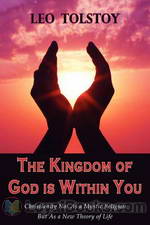 The Kingdom of God is within you
The Kingdom of God is within you
The title of the book comes from Luke 17:21. It is a non-fiction work of the famous Russian author Leo Tolstoy. He wrote it after many years of reflexion on Christianity and Jesus. Many subjects are present such as wars, non-violence, misunderstanding by believers of the faith, etc. | |
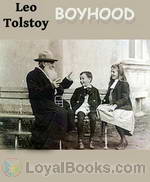 Boyhood
Boyhood
Boyhood is the second in Tolstoy's trilogy of three autobiographical novels, including Childhood and Youth, published in a literary journal during the 1850s. (Introduction by Bill Boerst) | |
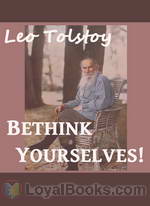 Bethink Yourselves!
Bethink Yourselves!
As Russia goes to war against Japan, Tolstoy urges those at all levels of society, from the Tsar down to the common soldier, to consider their actions in the light of Christ's teaching. "However strange this may appear, the most effective and certain deliverance of men from all the calamities which they inflict upon themselves and from the most dreadful of all—war—is attainable, not by any external general measures, but merely by that simple appeal to the consciousness of each separate man which, nineteen hundred years ago, was proposed by Jesus—that every man bethink himself, and ask himself, who is he, why he lives, and what he should and should not do... | |
By: Mark Twain (1835-1910) | |
|---|---|
 Life on the Mississippi
Life on the Mississippi
A river memoir documenting Twain’s early days as an apprentice steamboat pilot on the Mississippi River before the American Civil War. Reminiscing about his happy experiences as a young man under the instruction of an experienced mentor, the autobiographical tale depicts one of the most vivid illustrations of river life. Furthermore, the book captures the author’s nostalgic emotions through his resonant depiction of one of the most notable periods of his life. Twain begins his memoir with a rich historical account of the Mississippi River including its exploration by early explorers, its evolution, and its vastness... | |
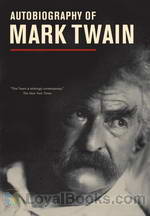 Chapters from my Autobiography
Chapters from my Autobiography
“...if I should talk to a stenographer two hours a day for a hundred years, I should still never be able to set down a tenth part of the things which have interested me in my lifetime.” The words of Mark Twain in his introduction to Chapters from my Autobiography provide a tantalizing glimpse of what is in store for the reader! Mark Twain, whose real name was Samuel Langhorne Clemens was still working on his reminiscences when he died in 1910. This book is really only a portion of the complete work... | |
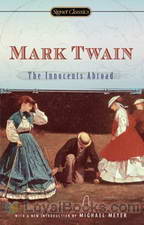 The Innocents Abroad
The Innocents Abroad
When you dive into Mark Twain’s (Samuel Clemens’) The Innocents Abroad, you have to be ready to learn more about the unadorned, ungilded reality of 19th century “touring” than you might think you want to learn. This is a tough, literary journey. It was tough for Twain and his fellow “pilgrims”, both religious and otherwise. They set out, on a June day in 1867, to visit major tourist sites in Europe and the near east, including Greece, Turkey, Lebanon, Syria, “the Holy Land”, and Egypt... | |
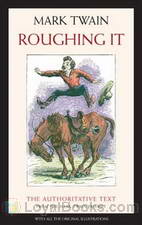 Roughing It
Roughing It
The semiautobiographical travel memoir records Twain’s, more or less, personal journey across the Wild West in search of adventure while exploring variable locations. Accompanying his brother on what becomes a trip of a lifetime, the young Samuel Clemens finds himself in many different vocational roles as he explores and observes the magnificence of the American West. Not refraining from the usual social commentary, Twain directs criticism on various social and moral issues which he approaches through his sly and witty style... | |
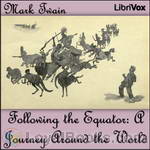 Following the Equator: A Journey Around the World
Following the Equator: A Journey Around the World
Following the Equator (American English title) or More Tramps Abroad (English title) is a non-fiction travelogue published by American author Mark Twain in 1897. Twain was practically bankrupt in 1894 due to a failed investment into a “revolutionary” typesetting machine. In an attempt to extricate himself from debt of $100,000 (equivalent of about $2 million in 2005) he undertook a tour of the British Empire in 1895, a route chosen to provide numerous opportunities for lectures in the English language... | |
 Fenimore Cooper's Literary Offences
Fenimore Cooper's Literary Offences
This is Mark Twain's vicious and amusing review of Fenimore Cooper's literary art. It is still read widely in academic circles. Twain's essay, Fenimore Cooper's Literary Offenses (often spelled "Offences") (1895), particularly criticized The Deerslayer and The Pathfinder. Twain wrote at the beginning of the essay: 'In one place in Deerslayer, and in the restricted space of two-thirds of a page, Cooper has scored 114 offenses against literary art out of a possible 115. It breaks the record.' Twain listed 19 rules 'governing literary art in domain of romantic fiction', 18 of which Cooper violates in The Deerslayer. (Introduction by Wikipedia and John Greenman) | |
 In Defense of Harriet Shelley
In Defense of Harriet Shelley
Mark Twain pulls no punches while exposing the "real" Percy Shelley in this scathing condemnation of Edward Dowden's "Life of Shelley". Even though, as Twain writes, "Shelley's life has the one indelible blot upon it, but is otherwise worshipfully noble and beautiful", Twain shows how Shelley's extra-marital conduct might easily be seen to have been the cause of his wife Harriet's suicide. (Introduction by John Greenman) | |
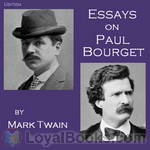 Essays on Paul Bourget
Essays on Paul Bourget
Collection of short essays concerning French novelist and critic Paul Bourget. Included: "What Paul Bourget Thinks of Us" and "A Little Note to M. Paul Bourget". | |
By: Unknown | |
|---|---|
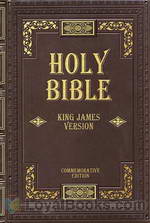 The Bible, King James Version (KJV) - Introduction
The Bible, King James Version (KJV) - Introduction
Variously known as the Greatest Story Ever Told, The Book of Books and many other names, the Bible is reputed to be the biggest bestseller of all time. Translated into thousands of world languages and studied, worshiped and revered in the four corners of the earth, the Bible remains Christianity's canonical text and is considered the Word of God. The King James Version (KJV) is a translation commissioned by the Church of England in 1604 and the work continued till 1611. However, it wasn't the first translation into English from the original Hebrew, and some portions in Aramaic... | |
By: Charles Dickens (1812-1870) | |
|---|---|
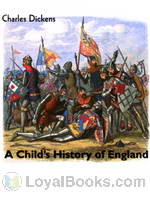 A Child's History of England
A Child's History of England
A Child’s History of England first appeared in serial form, running from January 25, 1851 to December 10, 1853 and was first published in three volume book form in 1852, 1853, and 1854. Dickens dedicated the book to “My own dear children, whom I hope it may help, bye and bye, to read with interest larger and better books on the same subject”. The history covered the period between 50 BC and 1689, ending with a chapter summarising events from then until the ascension of Queen Victoria. | |
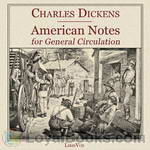 American Notes for General Circulation
American Notes for General Circulation
American Notes for General Circulation is a travelogue by Charles Dickens detailing his trip to North America from January to June, 1842. While there he acted as a critical observer of these societies almost as if returning a status report on their progress. This can be compared to the style of his Pictures from Italy written four years later, where he wrote far more like a tourist. His American journey was also an inspiration for his novel Martin Chuzzlewit. | |
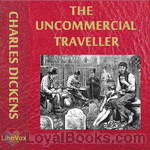 The Uncommercial Traveller
The Uncommercial Traveller
The Uncommercial Traveller is a collection of literary sketches and reminiscences written by Charles Dickens. In 1859 Dickens founded a new journal called All the Year Round and the Uncommercial Traveller articles would be among his main contributions. He seems to have chosen the title and persona of the Uncommercial Traveller as a result of a speech he gave on the 22 December 1859 to the Commercial Travellers' School London in his role as honorary chairman and treasurer. The persona sits well with a writer who liked to travel, not only as a tourist, but also to research and report what he found; visiting Europe, America and giving book readings throughout Britain... | |
 Pictures from Italy
Pictures from Italy
e: Dickens takes time off his novels to give an account of travels which he and his family undertook in France and Italy. There are vivid descriptions of the places, but also of the people and their lives. | |
By: Henrietta Elizabeth Marshall (1867-1941) | |
|---|---|
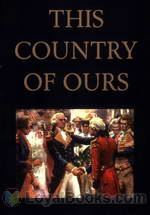 This Country of Ours
This Country of Ours
History made interesting for young readers—This Country of Ours by Henrietta Elizabeth Marshall provides a simple and easy to comprehend way of looking at the history of the United States. Arranged chronologically in seven long chapters, it presents events in a story form, making them memorable and very different from other formats. One of the challenges that writers of history face is about fleshing out the characters and making the bland repetition of dates and dynasties seem relevant to modern day readers... | |
By: Edward Gibbon (1737-1794) | |
|---|---|
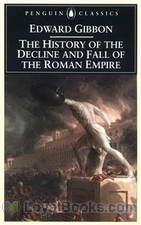 History of the Decline and Fall of the Roman Empire
History of the Decline and Fall of the Roman Empire
Spanning a period of nearly 1500 years, this monumental work of history tracks the orbit of one of the greatest Empires of all time. The sheer scale and sweep of the narrative is breathtaking in its ambitious scope and brings to vivid life the collapse of a magnificent military, political and administrative structure. Proceeding at a brisk pace, the original fourteen volumes describe debauched emperors, corrupt practices, usurpers and murderers, bloody battles, plunder and loot, barbarian hordes, tumultuous events like the Crusades and invaders like Genghis Khan and many more... | |
By: Charles Austin Beard (1874-1948) | |
|---|---|
 History of the United States: The Colonial Period Onwards
History of the United States: The Colonial Period Onwards
Vol. I: The Colonial Period. Charles Austin Beard was the most influential American historian of the early 20th century. He published hundreds of monographs, textbooks and interpretive studies in both history and political science. He graduated from DePauw University in 1898, where he met and eventually married Mary Ritter Beard, one of the founders of the first Greek-letter society for women, Kappa Alpha Theta. Many of his books were written in collaboration with his wife, whose own interests lay in feminism and the labor union movement (Woman as a Force in History, 1946)... | |
By: Thomas Babington Macaulay (1800-1859) | |
|---|---|
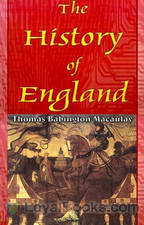 The History of England, from the Accession of James the Second
The History of England, from the Accession of James the Second
Hailed more as a literary masterpiece than an accurate account of historical facts, The History of England from the Accession of James the Second by Thomas Babington Macaulay is an admirable mix of fact and fiction. Modern day readers may find much that is offensive and insensitive in this five volume work which covers a particular period in the long and eventful history of Britain. However, it is certainly a book that leads the reader on to further research into the events and people mentioned... | |
By: Robert Louis Stevenson | |
|---|---|
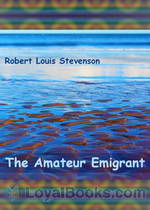 The Amateur Emigrant
The Amateur Emigrant
In July 1879, Robert Louis Stevenson left Scotland to meet his future wife in her native California. Leaving by ship from Glasgow, Scotland, he determined to travel in steerage class to see how the working classes fared. At the last minute he was convinced by friends to purchase a ticket one grade above the lowest price, for which he was later thankful after seeing the conditions in steerage, but he still lived among the ‘lower’ classes. His comments on the experience make interesting reading. His father however was so shocked at the thought of his son associating with people ‘beneath him’ that the work was not published for a number of years, | |
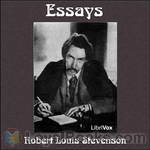 Essays of Robert Louis Stevenson
Essays of Robert Louis Stevenson
“Extreme busyness…is a symptom of deficient vitality; and a faculty for idleness implies a catholic appetite and a strong sense of personal identity.” What comforting words for the idle among us! Like many of the best essayists, Stevenson is very much the genial fireside companion: opinionated, but never malicious; a marvellous practitioner of the inclusive monologue. In this collection of nine pieces he discusses the art of appreciating unattractive scenery, traces the complex social life of dogs, and meditates in several essays upon the experience of reading literature and writing it... | |
 Travels with a Donkey in the Cevennes
Travels with a Donkey in the Cevennes
A classic of travel writing, this book recounts Stevenson's adventures on an extended walk through uplands and mountains in south-western France. Humorous on his own failings as a traveller, and on his travails with Modestine the self-willed donkey, it is also an exploration of peasant life in an area marked by the violence of the wars of religion. This version includes the fragment "A mountain town in France", originally intended as the opening chapter, but often omitted and published as a separate essay. | |
By: H. G. Wells (1866-1946) | |
|---|---|
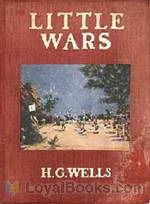 Little Wars (A Game for Boys)
Little Wars (A Game for Boys)
Miniature wargaming got its start with the publication in 1913 of this thoroughly entertaining little account of how H.G. Wells, with certain of his friends, took their childhood toys and turned play into acceptable middle-aged sport by subjecting the exercise to the civilizing influence of actual rules. While wargaming progressed far past these beginnings, Wells observes how “little wars” with even his elementary rules can suggest the wholesale crudity of the real thing. “You have only to play at Little Wars three or four times to realise just what a blundering thing Great War must be... | |
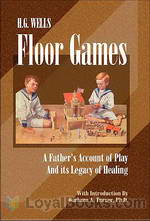 Floor Games
Floor Games
H.G. Wells had so much fun playing with his children on the floor of their playroom, he decided to write a jovial little book to inspire other parents in their pursuit of quality time with the kids. While the raw materials available from hobby stores of his day were woefully short of the variety and quality of what can be bought easily now, he and his sons created their own worlds to rule. This short work describes two games of imagination played out upon the floor of his home – an archipelago of islands, and a thoroughly integrated city, conveniently organized with two mayoral positions for his sons “G... | |
By: Jack London (1876-1916) | |
|---|---|
 John Barleycorn or Alcoholic Memoirs
John Barleycorn or Alcoholic Memoirs
Jack London died at the age of forty. In this autobiographical work, London describes his life as seen through the eyes of John Barleycorn (alcohol). There is much controversy about the cause of his death just as there is about alcoholism and addiction. London’s brutally frank and honest analysis of his own struggles and bouts with alcohol was way before its time and more modern theories of addiction. With remarkable candor and insight, London describes the demons and gods he encountered through both friend and enemy, John Barleycorn. | |
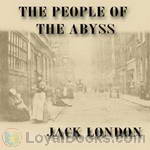 The People of the Abyss
The People of the Abyss
Jack London lived for a time within the grim and grimy world of the East End of London, where half a million people scraped together hardly enough on which to survive. Even if they were able to work, they were paid only enough to allow them a pitiful existence. He grew to know and empathise with these forgotten (or ignored) people as he spoke with them and tasted the workhouse, life on the streets, … and the food, which was cheap, barely nutritious, and foul.He writes about his experiences in... | |
By: Various | |
|---|---|
 Victorian Short Stories of Troubled Marriages
Victorian Short Stories of Troubled Marriages
A delightful collection of short stories by some of the luminary authors of the Victorian era. These stories explore the truth behind the victorian marriage. | |
By: Rudyard Kipling (1868-1936) | |
|---|---|
 France At War: On the Frontier of Civilization
France At War: On the Frontier of Civilization
In 1915, as the "Great War" (World War 1) entered its second year Rudyard Kipling made a journalistic tour of the front, visiting French armed forces. By then he was already winner of the Nobel Prize for Literature (the first writer in English to be so honoured). He published his observations in articles in the Daily Telegraph in England, and in the New York Sun. At that stage of the war nationalistic sentiments were running high but the true cost of war was beginning to be understood "at home"... | |
 Letters of Travel
Letters of Travel
| |
By: Unknown | |
|---|---|
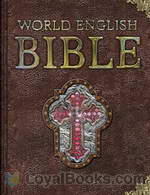 World English Bible (WEB) - Matthew
World English Bible (WEB) - Matthew
The World English Bible (also known as WEB) is a public domain translation of the Bible that is currently in draft form. Work on the World English Bible began in 1997 and was known as the American Standard Version 1997. The New Testament is considered complete and is available in print.The World English Bible project was started to produce a modern English Bible version that is not copyrighted, does not use archaic English (such as the KJV), or is not translated in Basic English (such as the Bible In Basic English)... | |
By: Alexandre Dumas (1802-1870) | |
|---|---|
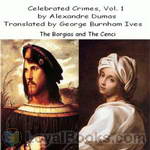 Celebrated Crimes
Celebrated Crimes
Dumas's 'Celebrated Crimes' was not written for children. The novelist has spared no language -- has minced no words -- to describe the violent scenes of a violent time.In some instances facts appear distorted out of their true perspective, and in others the author makes unwarranted charges. The careful, mature reader, for whom the books are intended, will recognize, and allow for, this fact.The first volume comprises the annals of the Borgias and the Cenci. The name of the noted and notorious Florentine family has become a synonym for intrigue and violence, and yet the Borgias have not been without stanch defenders in history... | |